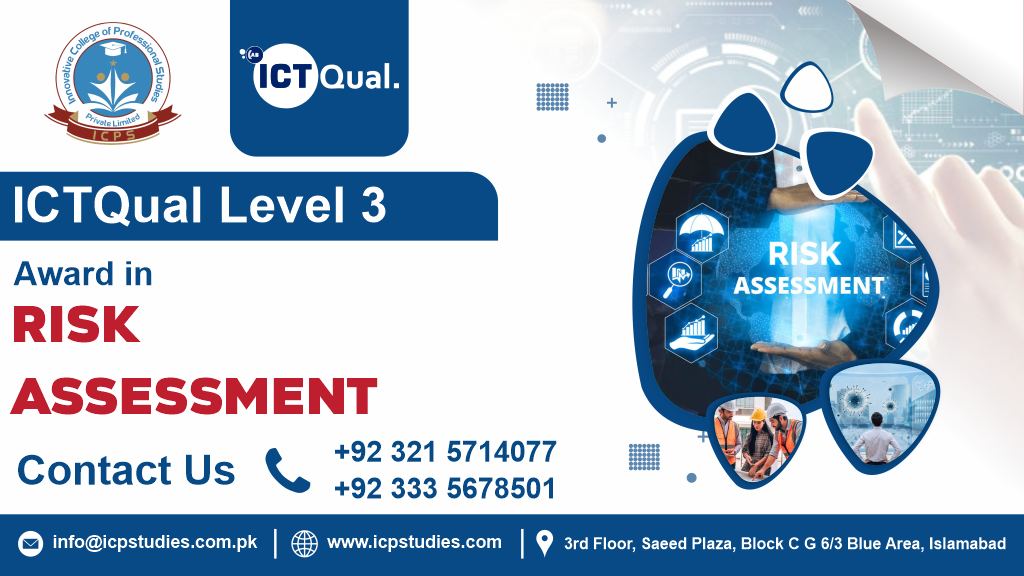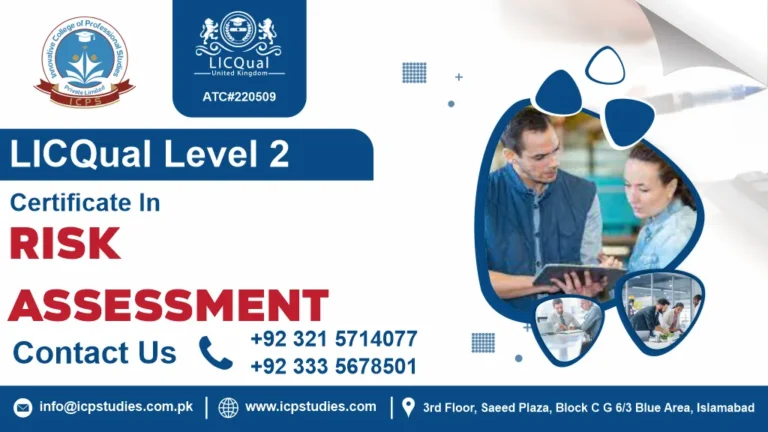In today’s complex and safety-conscious work environment, the ability to identify, evaluate, and manage risks is essential for ensuring the well-being of employees and the smooth operation of any organization. The Level 3 Award in Risk Assessment is a vital qualification for professionals tasked with overseeing health and safety procedures. This award equips individuals with the skills and knowledge needed to conduct effective risk assessments, comply with legal requirements, and implement risk management strategies.
The Level 3 Award in Risk Assessment is a professional qualification designed to provide participants with the ability to identify and assess risks within a workplace and develop strategies to mitigate those risks. This course is aimed at individuals who need to understand and apply risk assessment principles as part of their role, ensuring they can protect people and assets from potential hazards.
The Level 3 Award in Risk Assessment is a valuable qualification for anyone involved in managing health and safety within their organization. By providing a thorough understanding of risk assessment principles, legal requirements, and practical application, this award equips professionals to create safer work environments and effectively manage potential hazards. Whether you are a health and safety manager, a supervisor, or an employee with safety responsibilities, this course offers the skills and knowledge needed to excel in risk management and contribute to a safer workplace.
All About ICTQual Level 3 Award in Risk Assessment
Course Overview
The Level 3 Award in Risk Assessment is a professional qualification designed to equip individuals with the skills and knowledge necessary to conduct comprehensive risk assessments within their workplace. This award is an essential credential for those responsible for identifying, evaluating, and managing risks to ensure health and safety in various environments.
The Level 3 Award in Risk Assessment is a crucial qualification for anyone involved in health and safety management. It provides essential skills for identifying, evaluating, and managing risks, ensuring compliance with legal requirements, and enhancing workplace safety. By completing this award, individuals gain the expertise needed to create safer work environments and contribute to effective risk management within their organizations.
Study Units
- Introduction to Risk Assessment
- Legal and Regulatory Frameworks
- Risk Identification
- Risk Evaluation and Analysis
- Risk Control Measures
- Risk Communication and Documentation
- Review and Continuous Improvement
To enroll in the ICTQual Level 3 Award in Risk Assessment, participants typically need to meet the following requirements:
- Age Requirement: Participants should be at least 16 years old.
- Basic Literacy and Numeracy: A good understanding of English, along with basic literacy and numeracy skills, is essential for completing the course.
- Relevant Experience: While not mandatory, prior experience in health and safety or risk management is beneficial.
- Prior Knowledge: Familiarity with basic health and safety principles or regulations can be advantageous.
- Course Registration: Participants must register for the course through an accredited training provider.
- Payment: Course fees must be paid as required by the training provider.
- Commitment to Attend: Participants should be prepared to attend the full duration of the course and complete any required assessments to receive certification.
Always check with the specific training provider for any additional or varying requirements.
The ICTQual Level 3 Award in Risk Assessment is designed for:
- Health and Safety Professionals: Individuals responsible for managing and implementing health and safety policies in various organizations.
- Supervisors and Managers: Those overseeing teams and needing to understand risk assessment processes to ensure workplace safety.
- Safety Officers: Professionals tasked with conducting risk assessments and ensuring compliance with health and safety regulations.
- Team Leaders: Individuals in charge of workgroups who need to identify and manage risks within their teams.
- Anyone Involved in Risk Management: Employees in various sectors who want to enhance their knowledge and skills in assessing and managing risks.
- Consultants: Those advising organizations on health and safety practices and risk management strategies.
This course equips participants with the skills and knowledge necessary to effectively conduct risk assessments, helping to create safer working environments across different industries.
Learning Outcome
. Introduction to Risk Assessment
Learning Outcomes:
- Understand Risk Assessment Principles: Demonstrate a comprehensive understanding of the fundamental principles of risk assessment, including its purpose and importance in maintaining workplace safety.
- Identify Key Concepts: Recognize and explain key concepts such as hazards, risks, and control measures.
- Explain the Risk Assessment Process: Describe the steps involved in conducting a risk assessment from initial identification to implementation of controls.
2. Legal and Regulatory Frameworks
Learning Outcomes:
- Understand Legal Requirements: Explain relevant health and safety legislation and regulations that govern risk assessments, including key responsibilities and obligations for organizations and individuals.
- Apply Compliance Standards: Demonstrate the ability to apply legal and regulatory requirements to risk assessment practices within the workplace.
- Identify Regulatory Bodies: Recognize the role of regulatory bodies and standards organizations in shaping risk assessment practices and ensuring compliance.
3. Risk Identification
Learning Outcomes:
- Identify Hazards: Develop skills to systematically identify potential hazards in various workplace environments, including physical, chemical, biological, and ergonomic hazards.
- Use Identification Tools: Apply tools and techniques for hazard identification, such as checklists, brainstorming, and workplace inspections.
- Document Findings: Accurately document identified hazards to ensure a comprehensive risk assessment.
4. Risk Evaluation and Analysis
Learning Outcomes:
- Evaluate Risk Likelihood and Impact: Demonstrate the ability to assess the likelihood and potential impact of identified hazards using risk assessment matrices and other evaluation tools.
- Prioritize Risks: Prioritize risks based on their severity and potential consequences, enabling effective resource allocation for risk management.
- Analyze Risk Data: Analyze data collected during risk evaluation to make informed decisions about risk control measures.
5. Risk Control Measures
Learning Outcomes:
- Develop Control Measures: Create effective risk control measures and strategies to reduce or eliminate identified risks, including engineering controls, administrative controls, and personal protective equipment.
- Implement Controls: Demonstrate the ability to implement and integrate risk control measures into workplace procedures and practices.
- Assess Control Effectiveness: Evaluate the effectiveness of implemented control measures and make adjustments as necessary to ensure continued risk mitigation.
6. Risk Communication and Documentation
Learning Outcomes:
- Communicate Risks: Develop skills to effectively communicate risk assessment findings and control measures to all relevant stakeholders, including employees, management, and regulatory bodies.
- Prepare Documentation: Create clear and comprehensive risk assessment reports and documentation, including risk registers and action plans.
- Ensure Understanding: Ensure that risk communication is clear, concise, and understood by all relevant parties to promote a culture of safety.
7. Review and Continuous Improvement
Learning Outcomes:
- Conduct Reviews: Perform regular reviews of risk assessments to ensure they remain current and relevant, incorporating feedback and new information as necessary.
- Implement Continuous Improvement: Apply principles of continuous improvement to risk assessment processes, identifying opportunities for enhancement and updating procedures accordingly.
- Monitor and Evaluate: Monitor the effectiveness of risk control measures and assess the need for further improvements based on ongoing review and feedback.
These learning outcomes ensure that participants in the Level 3 Award in Risk Assessment gain a comprehensive understanding of the risk assessment process, from identification through to continuous improvement, and are well-equipped to apply these skills in their professional roles.
FAQs about ICTQual Level 3 Award in Risk Assessment






